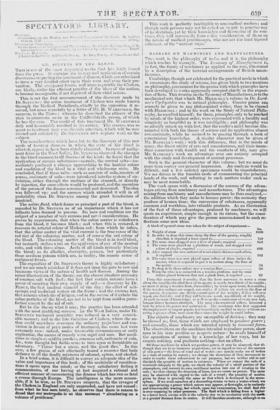Di. STEVENS ON 'H3 ILLOOD.
Taus is 'one a the most important works that has lately issued flora the press. 714 contains the history and. application of certain discoveries respee tilig the treatment of disease, which are calculated to bave a verv Ciecided effect upon their care and even their pre- vention. The maliguant fevers, and more especially the Cholera, are likely, under the efficient practice of the ideas of the author, to become manageable, if not deprived of their chief terrors.
This is not the first announcement of the..discovery made by Dr. STEVENS: the saline treatment of Cholera was made known through the Medical Periodicals, chiefly by the opposition it re- ceived, but more especially by a letter of Mr. H. -WAKEFIELD, the surgeon, in the Times; wherein he described the efficacy of the plan in numerous eases in the Coldbathficdds prison, of which he has the care. The credit of this treatment Mr. WAKEFIELD duly and honourably ascribed to its author. The success was so great as to attract very conderable attention, which will be now riveted and satisfied by Dr. STEVENS'S Owll copious work on the subject. The considerations which have led to the discovery of this new node of treating diseases in which the state of the blood is affected, appear to have been chiefly chemical. In cases of malig- nant fever in the West Indies, Dr. STEVENS observed the changes in the blood comment° all diseases of the kind: he found that the application of certain substances—namely, the neutral salts—im- mediately produced a change approaching to the healthy colour and condition of the blood in a vital and wholesome state. He concluded, that if these salts—such as muriate of soda, muriate of potass, carbonate of soda—were introduced into the system of cir- culation, either through the medium of the stomach, or directly by injection, the same effects would be produced, and the operation of the poison of the disease counteracted and destroyed. The idea was followed up ; and the success which attended it will in all probability class Dr. STEVENS among the great benefactors of mankind.
The salinefluid, which forms so principal a part of the blood, is regarded by Dr. STEVENS as of an importance which it has not hitherto been deemed to possess. Its uses and condition are the subject of a number of very curious and novel considerations.. He proves by experiments, that when the saline matter is withdrawn from the 'blood, it becomes black ; and when this is restored, it recovers its arterial colour of Modena red : from which he infers, that the saline matter of the vital current is the true cause of the red tint of the colouring matter, and of course the red colour of the blood. The colouring matter of the blood is in itself black, but instantly strikesa red on the application of any of the neutral salts, and with them alone. Acids of all kinds instantly blacken the blood; as do alkalies, electricity, poisons, but particularly those aeriform poisons which are, in reality, the remote cause of malignant fevers. The exposition of Dr. STEVENS'S theory is highly satisfactory; and we are much mistaken if it does not open the gate to new and luminous views of the nature of health and disease. Among the minor illustrations of the theory, are the almost abSolute necessity of common salt with food ; the fkct that certain animals have a power of secreting. their own supply of salt,—a discovery by Dr. PROUT, the first medical chemist of the day ; the effect of salt- springs and medicinal waters on the frame ; and the curious filet, that animals which die of fatigue, and in the course of it exhale the saline particles of the blood, are not to be kept from sudden putre- faction except by the aid of salt.
But be the theory what it may, the practice has been attended with the most gratifying success. In the West Indies, under Dr. STEVENS 's treatment mortality was reduced in a very remark- able manner; and in the late visitation of Cholera, where the au- thor could anywhere overcome the ordinary prejudices and con- viction in favour of prior modes of treatment, the cases lost were extremely rare : indeed, under favourable circumstances or early application, the means of remedy were rapid and sure. But medi- cines so simple as seidlitz powders, common salt, carbonate of soda, were thought but feeble arms to turn upon so formidable an adversary. "Throw but a stone, and the giant dies." In this case, a few grains of salt effectually tamed a monster that bade defiance to all the deadly mixtures of calomel, opium, and alcohol.
In a brief notice, it is difficult to convey an adequate idea of the value and importance of this book; of the multitude of considera- tions it opens upon the mind; or the very satisfactory feeling it communicates, of our having at last acquired a rational and efficient manner-Of encountering the disease which has run so fatal a course through -Europe. The intelligence is the more season- able, if it be true,eas Dr. STEVENS suspects, that the ravages of the Cholera in England are only suspended, and have not ceased : from what he has seen lately; he observes that there is reason to dread that ourmetropolis is at this moment "slumbering on a volcano of pestilence'
This work is perfectly intelligible to non-medical readers; and though such persons may not be called on to put in practice any of its doctrines, yet by their knowledge and discussion of its con- tents, they will necessarily force a due consideration of them on the minds of medical practitioners, who are not the least bigoted adherents of the " ancient ways."


























 Previous page
Previous page